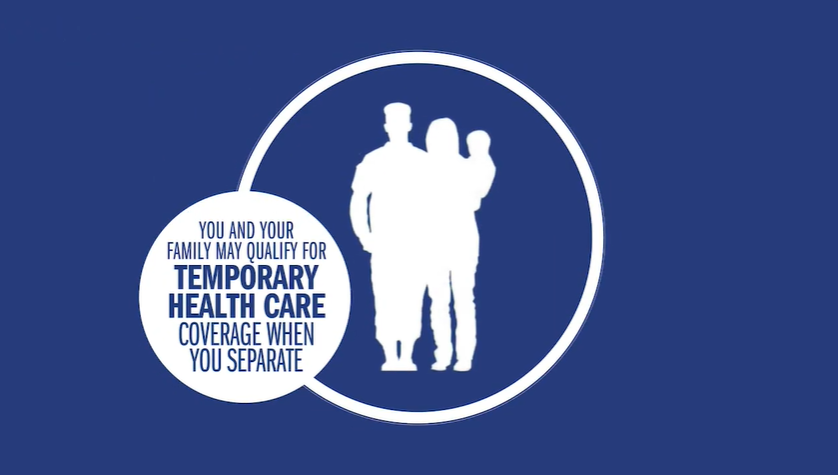Tricare coverage after separation lasts for 180 days. After separating from the military, you can continue to receive Tricare coverage for up to 180 days.
During this period, you will have access to the same benefits and healthcare services as active-duty military members. This transitional coverage is aimed at providing a smooth transition to civilian healthcare for service members and their families. It is important to be aware of these time limitations and ensure that you have made appropriate arrangements for healthcare coverage after the 180-day period.
Understanding Tricare’s post-separation coverage can help you plan for your healthcare needs and ensure a seamless transition to civilian life.
Understanding Tricare Coverage After Separation
As a military service member, understanding your Tricare coverage after separation is crucial. Tricare provides healthcare benefits to active duty service members, retirees, and their families. After separation, the length of time you have Tricare coverage depends on your specific circumstances.
| Category | Timeframe |
|---|---|
| Active Duty Service Members | 180 days of transitional coverage |
| Retirees | Eligible for Tricare Retired Reserve or Tricare Select |
| Family Members | May qualify for transitional coverage or other Tricare plan options |
| Service-Connected Disabilities | May be eligible for continuing Tricare coverage under different programs |
It’s important to review the specific benefits and options available to you based on your situation. This ensures a smooth transition in terms of healthcare coverage and allows you to make informed decisions about your healthcare needs. Don’t leave your Tricare coverage after separation to chance – take the time to understand what you qualify for and how to access the benefits.
Tricare Coverage During Transition Period
Tricare coverage during the transition period after separation can provide valuable healthcare services for military personnel and their families. It is important to understand the benefits and limitations associated with this coverage.
During the transition period, individuals who separate from the military can maintain their Tricare coverage for a limited time. For a period of 180 days after separation, individuals and their families can continue to receive healthcare services through Tricare.
Benefits of Tricare coverage during the transition period include access to a wide network of providers, comprehensive healthcare coverage, and prescription drug benefits. This can provide peace of mind during the transition from active duty to civilian life.
However, it is important to be aware of the limitations of Tricare coverage during the transition period. Certain services may require prior authorization, and there may be out-of-pocket costs associated with certain procedures or medications.
Overall, Tricare coverage during the transition period offers important healthcare support for military personnel and their families. Understanding the benefits and limitations can help individuals make informed decisions about their healthcare needs during this period.

Tricare Options After Separation
When separating from the military, it’s important to understand the Tricare options available to you. Tricare provides health care coverage to military personnel and their families, and it offers several options for coverage after separation.
After separation, you may be eligible for one of the following Tricare plans:
| Tricare Plan | Eligibility Requirements | Enrollment Process |
|---|---|---|
| Tricare Prime | Active duty service members and their families | Contact your nearest Tricare service center |
| Tricare Select | All military retirees and their families | Enroll online through the Tricare website |
| Tricare for Life | Retired military personnel eligible for Medicare | No enrollment required, automatically enrolled |
| Tricare Reserve Select | Selected Reserve members and their families | Enroll online or by mail |
It’s important to review the eligibility requirements and enrollment processes for each Tricare plan to ensure you have the coverage you need after separation. Be sure to reach out to your nearest Tricare service center or visit the Tricare website for more information on your specific situation.
Comprehensive Coverage Period
If you are a member of the military and considering separation, understanding the duration of Tricare coverage after separation is crucial. The comprehensive coverage period, which follows separation from active duty, allows you to continue receiving Tricare benefits for a certain period of time. The length of this coverage varies based on your specific circumstances.
For most servicemembers, the comprehensive coverage period lasts for 180 days from the date of separation. During this time, you and your eligible family members will have access to the same Tricare benefits you had while on active duty. This includes coverage for medical and mental health services, prescription medications, and hospital stays.
It’s important to note that the coverage period may be extended under certain circumstances. For example, if you are retiring from the military after 20 or more years of service, you may be eligible for Tricare coverage for life. Additionally, if you have a service-connected disability, you may be eligible for ongoing Tricare benefits through the Department of Veterans Affairs.
Understanding the duration of Tricare coverage after separation is vital for planning your healthcare needs and ensuring a seamless transition to civilian life. Be sure to contact Tricare directly or reach out to a military support organization for personalized guidance based on your unique situation.
Extension Options For Tricare Coverage
After separation from the military, it is crucial to understand how long you can retain your Tricare coverage. There are several extension options available to ensure continuous healthcare coverage for you and your family.
When exploring extension options for Tricare coverage after the comprehensive coverage period, it is important to consider various factors. These include:
| Transition Assistance Management Program (TAMP) | Provides up to 180 days of Tricare coverage for service members separating under specific circumstances. |
| Continued Health Care Benefit Program (CHCBP) | Allows eligible beneficiaries to purchase Tricare for up to 36 months. |
| TRICARE Young Adult | Offers coverage to young adults up to the age of 26. |
| Employer-Sponsored Insurance (ESI) | Consider the possibility of obtaining healthcare coverage through a new employer. |
Choosing the right extension option depends on your specific circumstances and healthcare needs. It is advisable to carefully evaluate the available options and determine the most suitable choice for you and your family to ensure uninterrupted access to quality healthcare.
Converting To Tricare Retired Reserve
Tricare Retired Reserve is an option to consider after separation from military service. It provides healthcare coverage for retired military reserve members and their dependents. The eligibility for Tricare Retired Reserve is generally based on the member’s status as a retired reserve component member, age, and completion of qualifying years of service. The benefits include coverage for doctor visits, hospitalization, prescription medications, and preventive care.
By converting to Tricare Retired Reserve, you can continue to receive healthcare benefits while enjoying the flexibility that comes with civilian life. It is important to understand the eligibility requirements and enrollment process to ensure a seamless transition.
Exploring Tricare Retired Reserve as an option after separation involves familiarizing yourself with the coverage options available and understanding the costs involved. It is recommended to review the official Tricare website or consult with a Tricare representative for specific details regarding eligibility, coverage, and enrollment.
Transitioning To Other Health Insurance
Transitioning from Tricare to other health insurance after separation requires careful consideration of various factors. Here are some important aspects to keep in mind:
- Eligibility and Enrollment Periods: Understand the eligibility requirements and enrollment deadlines for the health insurance options you are considering.
- Coverage Options: Evaluate the different coverage options available under other health insurance plans. Compare the benefits, deductibles, copayments, and out-of-pocket expenses.
- Provider Networks: Determine if your preferred doctors and hospitals are in-network under the new health insurance plan. Consider the availability of specialists and hospitals near your location.
- Prescription Drug Coverage: Assess the prescription drug coverage offered by alternative health insurance plans. Ensure that they adequately meet your medication needs.
Remember to evaluate costs, including premiums, deductibles, copayments, and coinsurance. Take into account any pre-existing conditions and how they may be covered by the new insurance. Consulting with a professional insurance advisor can provide valuable guidance in making an informed decision.
Important Considerations After Separation
After separating from the military, it is crucial to update your personal information as soon as possible. This ensures that you continue to have access to Tricare benefits and receive important notifications. Make sure to update your contact information, including your mailing address, email address, and telephone number. Failure to update your personal information may result in a disruption of your healthcare coverage.
Additionally, it is essential to explore resources available to assist and guide you during the transition period. The Department of Defense offers various programs and services to support transitioning service members and their families. These resources can provide valuable information on healthcare options, job placement assistance, education benefits, and more. Take advantage of these resources to make your transition smoother and less stressful.
| Tips for Updating Personal Information | Importance of Exploring Resources |
|
|
Frequently Asked Questions For How Long Do I Have Tricare After Separation
How Long Is Tricare Coverage After Separation?
Tricare coverage after separation lasts for up to 180 days. It’s important to plan ahead for future healthcare needs.
Can I Extend My Tricare Coverage After Separation?
No, Tricare coverage cannot be extended after separation. Make sure to explore other healthcare options available.
What Are The Alternatives To Tricare After Separation?
After separation, you can consider alternatives like COBRA, individual insurance plans, or employer-sponsored coverage.
How Can I Find Out If I’m Eligible For Tricare After Separation?
To determine your eligibility for Tricare after separation, contact the Defense Manpower Data Center.
What Happens If I Don’t Have Tricare Coverage After Separation?
Without Tricare coverage after separation, you may be responsible for your own healthcare expenses. Consider other insurance options.
Can My Family Members Still Be Covered Under Tricare After Separation?
Family members may be eligible for continued Tricare coverage after separation through the Continued Health Care Benefit Program (CHCBP).
Conclusion
To summarize, after separation varies depending on the circumstances. For active duty service members, coverage continues for 180 days post-separation through the Transitional Assistance Management Program (TAMP). After TAMP ends, eligible individuals may opt for the Tricare Continued Health Care Benefit Program (CHCBP) for up to 18 more months.
It is crucial to explore all available options and understand the specific requirements for maintaining healthcare coverage beyond separation. Keeping informed about Tricare benefits will ensure a smooth transition into civilian life without any gaps in healthcare coverage.
Ismail Hossain is the founder of Law Advised. He is an Divorce, Separation, marriage lawyer. Follow him.





Leave a Reply